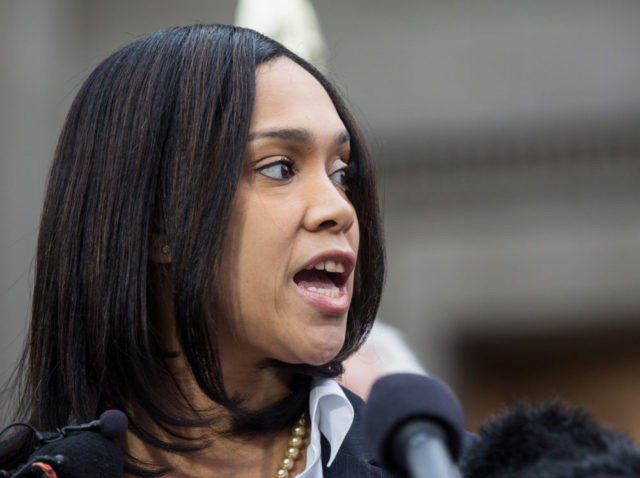An ethics complaint has been filed by a George Washington University law professor against Baltimore State’s Attorney Marilyn Mosby, asking the Maryland Bar Association to disbar her because of misconduct in her ill-fated indictment and prosecution of six police officers in the Freddie Gray case.
The complaint calls for an investigation into Mosby’s conduct connected with her prosecution of the cases on several grounds, including:
- that she did not have probably cause to believe that there was sufficient admissible evidence to support a conviction of the officers;
- that she made public statements regarding the case which were false;
- that she improperly withheld evidence from the defense that was exculpatory;
- that she continued to prosecute cases after the judge assigned to hear the cases found insufficient evidence to support a conviction;
- that she engaged in conduct that was dishonest, fraudulent, deceitful and which misrepresented the facts in the case.
Mosby’s indictments of the police officers were suspect from the beginning. Politically motivated, unjustified and made in response to the demands of Black Lives Matter and members of the radical black community, the 35-year-old, inexperienced and incompetent prosecutor stood before the press and the city that elected her, quoted the Al Sharpton line “No Justice, No Peace,” proclaimed that “our time has come,” and charged six officers with a string of criminal charges that stunned the Baltimore legal community. (Full disclosure: The Law Enforcement Legal Defense Fund, of which I am Chairman, is helping to financially support the legal fees of the six Baltimore police officers.)
But things are quickly coming apart at the seams for Mosby, a situation brought about by her own doing. The first case she brought to trial resulted in a hung jury. Next, she was excoriated by the judge for withholding exculpatory evidence. Then the second and third cases, tried to the judge, were returned with acquittals on every charge, on the basis that she had insufficient evidence to prove her case. Then two of the officers filed a civil suit against her for defamation and invasion of privacy. Now a very credible complaint calling for her disbarment must be addressed and investigated by the Maryland Bar Association, perhaps ending in her disbarment.
Mosby finds herself between the proverbial – and well-deserved – rock and a hard place. If she decides not to proceed with a retrial of the first officer and trials of the other three – as she has been called to do – she reinforces the charge that she never had sufficient evidence to prove her case in the first place. If she proceeds to try these cases and loses, which is likely, she will reinforce the ethics charges, making her disbarment more probable.
The first cases Mosby brought to trial were certainly the strongest of the six. Having lost those, her chance of getting any convictions are close to zero. Barry Williams, the no-nonsense judge assigned to the cases, who is also black and a former Justice Department civil rights prosecutor, made no bones about the fact, in his acquittals of the two officers, that the prosecution was derelict and had insufficient evidence. As the remaining cases are no doubt weaker for the prosecution than the first three, Judge Williams left little room for Mosby to redeem herself.
The legal system assumes that a prosecutor will not win every case, but it also assumes, and gives a prosecutor ample discretion and tools, that cases will not be tried that do not have at least a good chance of success. A former Assistant U.S. Attorney told me that never in his eighteen years prosecuting cases had he ever heard of a prosecutor losing three successive cases stemming from the same offense.
That the indictments were politically motivated by Mosby is without question. She had assumed the office barely 100 days before the Freddie Gray incident and no doubt thought that by indicting the arresting police officers – the targeted enemy of the rioting Black Lives Matter crowd – her political stock would go through the roof. But her political pandering didn’t stop with the indictments: Shortly after accusing attorneys for the indicted officers of conducting a “publicity blitz” and obtaining a gag order to keep them quiet, Mosby was photographed by the high-style Vogue magazine photographer Annie Leibowitz, and Vogue subsequently ran a gushing profile. And when rock singer Prince showed up in Baltimore for his first concert there in 14 years, he invited Mosby to the stage. Soon thereafter Maryland Democrat congressman Elijah Cummings publicly thanked God for her service – behavior than demonstrated her unprofessionalism and inexperience. Political motivation for an indictment is not in itself fatal. Coupled with lack of admissible evidence, it is.
Baltimore State’s Attorney Marilyn Mosby has done enormous damage to the jurisdiction that entrusted her with the office. First is the staggering increase in crime in Baltimore since the Freddie Gray incident – much of it attributable to the “Ferguson effect” of police reluctance to put themselves in danger of prosecution. She has also made it more difficult for other prosecutors to bring difficult cases, since she has generated distrust and suspicion of the justice system among her constituents. Even beyond that, however, is the damage she has done, and continues to do to the justice system itself, which relies on public trust and reliance, by the people affected by it, that it is run professionally, without bias, and without political interference.
Marilyn Mosby’s disbarment, after a thorough investigation of her motives in these cases against six honorable police officers, would be a fitting end to the ill-conceived and unprofessional conduct she has displayed in these cases.

COMMENTS
Please let us know if you're having issues with commenting.